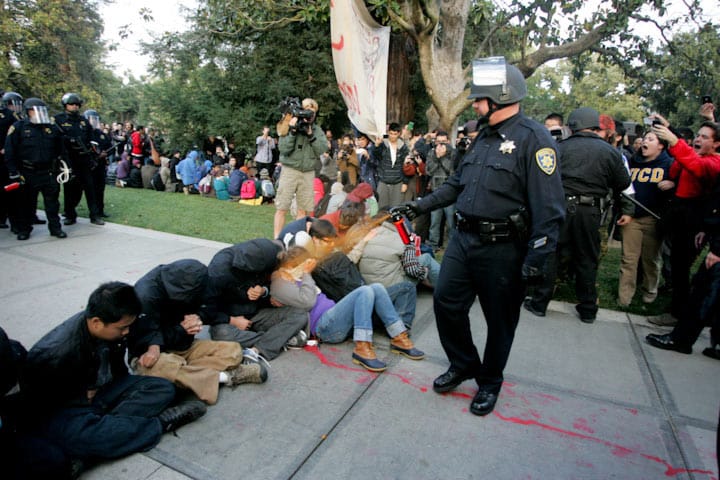UC Davis Task Force Takes Hard Line on Pepper Spray Incident


The task force report on the November 18th UC Davis pepper spray incident took some surprisingly strong swipes at the university’s chain of command, attacking decision-making and communications at the level of the police’s and the school’s leaders.
The report was released Wednesday after several weeks of delays based on court challenges by the police union seeking anonymity for individual officers involved in the incident.
A number of faculty members that I spoke with over the past week had not expected the report to be released so soon, nor had they anticipated such strong condemnations of the university. Some had suggested to me that the report was likely to be buried until the incident was forgotten.
On the contrary, the report was tough on the school and unsparing in its criticism of the actions taken against peaceful protesters.
"Our overriding conclusion can be stated briefly and explicitly," the report states. "The pepper spraying incident that took place on Nov. 18, 2011, should and could have been prevented." The Bellingham, WA Herald reported that the panel directly criticized police brass and administrators, including Chancellor Linda Katehi and police Chief Annette Spicuzza, for their lack of leadership.
Among other findings, the report reveals that Lt. John Pike, who sprayed the protesters, was standing much closer than the 6-foot distance recommended by the MK-9 spray device's manufacturer. According to the report, UC Davis officers were authorized to use less powerful spray cans, but not the MK-9, which produces a stream of irritant chemical rather than a spray.
The report also made it clear that the wishes of Chancellor Katehi and Chief Spicuzza had been ignored by the campus police. According to the San Francisco Chronicle:
“Chancellor Linda Katehi, for example, told investigators she anticipated a ‘limited operation’ in which police would demand the removal of the protest tents without using force. She either failed to get across her wishes or they were ignored - neither alternative speaks well of her leadership.”
Police also openly defied Chief Spicuzza's wish that officers not wear riot gear or use batons or pepper spray, and appeared to ignore her preference for a nighttime evacuation operation, choosing instead to evict the protesters at 3 p.m.
The task force was led by Cruz Reynoso, a law professor at UC Davis and a former California Supreme Court justice, and relied heavily on an investigation by Kroll, a private firm hired by the University of California.
Administrators told the task force they were concerned that protesters who did not attend UC Davis would flood the campus and endanger students. Spicuzza estimated that 80 percent of protesters camping in the campus quad were not students. But that figure was challenged by student affairs administrators, who had spent time talking with the protesters and said that the vast majority of campers were UC Davis students.
“The investigation found that the counterargument was largely ignored and administrators reiterated their concern for students,” according to the New York Times.
"It's a terrible failure on the part of campus leadership," said Samuel Walker, a criminal justice professor at the University of Nebraska whom the UC panel consulted. "I would say this is a wake-up call to campuses across the nation."



